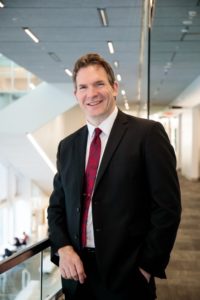Incoming Camosun College president Lane Trotter—who steps into the position on January 1, 2022—says that one of the main factors that appealed to him about Camosun was the comprehensive nature of education at the college. At most colleges in BC, he says, you can’t get trades, business, arts and science, and nursing at the same institution.
“For Camosun, it needs to meet the needs of the entire community,” says Trotter. “You need Creative Writing, you need University Transfer, you need the Business programs, you need the Health programs, because that’s supporting the entire community.”

Trotter, who is currently the president and chief executive officer at Langara College in Vancouver, says that post-secondary will continue to rely heavily on international students in its revenue modelling moving forward because projections indicate that 15 percent of Canada’s jobs between 2018 and 2028 need to be filled by international students. Those projections—which were from before COVID hit—include 1,000,000 skilled job openings in the province; two-thirds of those are because of people retiring and one-third are because of economic activity, says Trotter.
“If you look at our own ability to meet that internal need, 57 to 58 percent of that could have been filled with our own internal domestic capacity,” says Trotter. “Twenty-seven percent of that would have come through normal immigration channels, and that last 15 percent… would go unfilled for the economy.”
Trotter says the best way to fill high-demand areas in Canada is through Canadian education, both for domestic and international students.
“Bringing students into those high-demand areas where we need skilled individuals to support the growth of the economy [is essential],” he says, “and as the prime minister has said, the best way to make sure somebody adjusts to Canada and is ready for the culture of Canada is to have them come into a Canadian education.”
In regards to September’s return to campus, Trotter says that in the long term some students want to be back face-to-face while others like learning online or through mixed delivery; Trotter’s challenge is providing programs that students want, through the delivery methods that they want.
“Longer term, I think that means that [post-secondary institutions] will continue to have more online courses,” says Trotter, “and that will be based on demand by students.”
Trotter says, however, that he does not envision a world where post-secondary will be 100 percent online. Camosun Board of Governors chair Monty Bryant says that part of the reason Trotter got the job was his approach to online education. Bryant says there were a total of 34 applicants from presidents, vice-presidents and CEOs, all of whom were extremely well qualified. From there, the board made a longlist of 10 candidates, then a shortlist of five.
“He had the most experience of any of the candidates,” says Bryant. “He came across well; he came across, not necessarily [as] someone who said, ‘I’m coming in and changing the culture,’ but, ‘I’m coming into a place where I really respect.”’
Trotter is big on applied learning, says Bryant. While at BCIT from 1998 to 2009 as School of Transportation dean, Trotter helped to develop BCIT’s aerospace campus, which opened in 2007.
“He said, ‘[Camosun] is probably one of the best in the province for [applied learning], and I’d like to make it the best in Canada.’ That’s pretty inspiring,” says Bryant.
Reconciliation is also important to Trotter (Bryant says Trotter has committed to taking a course on the in-depth history of colonization). For Trotter, continuing reconciliation efforts at the college means not necessarily focusing on what he or the college thinks is best, but listening to the voices of the Indigenous community.
“I have to learn and listen,” says Trotter.
